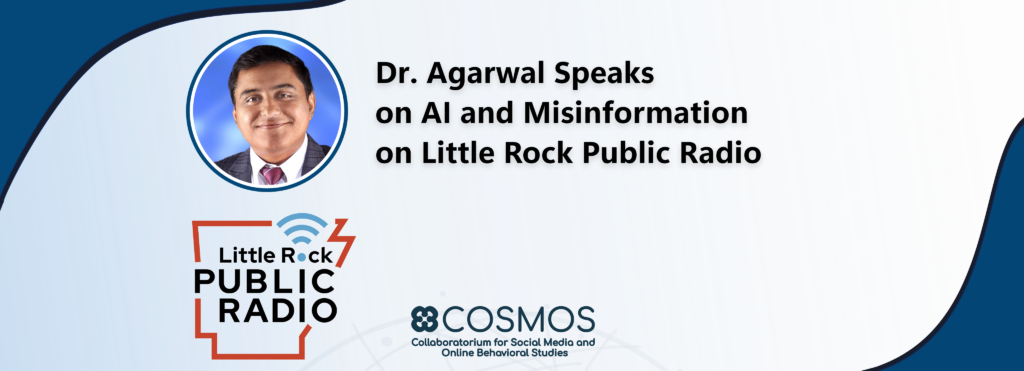
On September 12th, NPR aired a special program on digital misinformation and AI, as part of a series of panels on issues hosted by local Little Rock reporter Daniel Breen. In the panel interview, titled Issues That Matter: Digital Dilemmas: Navigating Truth in a Digital World, Dr. Nitin Agarwal spoke as one of the experts on the subject. The broadcast investigated the key questions behind mis- and disinformation awareness: What are common forms of both, and how do they appear and spread? What causes are behind their existence, and what real-world effects have they caused? And, importantly, what are governments world-wide doing to fight both, especially as technology like AI influences changes them? How do we improve digital literacy and other techniques to identify fake information online?
“They can range from absolute lies to truths that are pieced in such a manner that they can influence your beliefs and behaviors. So they are not outright false or misinformation, but the way information is pieced together, can influence you to believe otherwise,” reported Dr. Agarwal. He cited numerous contexts that misinformation campaigns appear within, saying “When we look at different parts of the world, whether it is the Americas, Europe, the global South or more specifically in the Asia-Pacific or the Indo-Pacific regions, we have seen how minority or marginalized communities like the Uyghurs are disproportionately affected from disinformation campaigns or influence campaigns.”
Especially, false or disinformation narratives can appear where “competitors seek to gain geo-political advantages” such as those in the Indo-Pacific regions “that China is great for the economy, great for partnership, building roads, bridges, infrastructure, etc., while at the same time acting as a loan shark.” He described how in the US misinformation has lead to numerous national issues, such as the exacerbation of COVID-19 from harmful fake or scam remedies for the virus, the mistreatment of marginalized communities, and anti-minority lynchings in the Global South. He also highlighted elections as a key context in which disinformation appears and wrecks havoc, by creating more polarized political discussions and echo chambers.
AI complicates how misinformation propagates. “It is advancing at a breakneck speed, as we have seen with deep fakes,” Dr. Agarwal says. “So there need to be much more advanced detection methods. We are developing those methods, what I call fighting fire with fire. We are leveraging AI to combat this type of problem.” Dr. Agarwal went on to describe the AI-enhanced techniques COSMOS is developing to combat AI-amplified misinformation, such as using social cyber forensics.
To discuss fixes for the issue, Dr. Agarwal pointed out legislation in other countries, such as the Prevention of Online Falsehoods and Misinformation Act (POFMA) recently implemented in Singapore. He also emphasized the importance in adopting a “whole of society approach to defeat or combat disinformation,” with a successful example being in Taiwan. “Very recently in Taiwanese elections, we saw that post elections, there was a misinformation campaign, suggesting that the elections or the electoral votes were not counted properly. . . .And then the whole of society got together, including lawmakers, election council, social media influencers, celebrities, in a massive campaign of awareness of how transparent the voting process is. The campaign was not about to say that, no, the other party is wrong, the other side is wrong—just to shed light on the process, the transparency of the process, and let people decide whether it is misinformation and disinformation or whether it is,” he describes. “You won’t believe within less than 24 hours, the whole disinformation campaign was debunked by the citizens and they were out on the streets rejoicing the victory of the election and victory of the party that legitimately won the election.” As he put it, “If you teach a man to fish, they’re set for life, as opposed to, you know, just giving them a fish.”
Listen to the full discussion that describes in detail the research at COSMOS to mitigate the impacts of misinformation.
